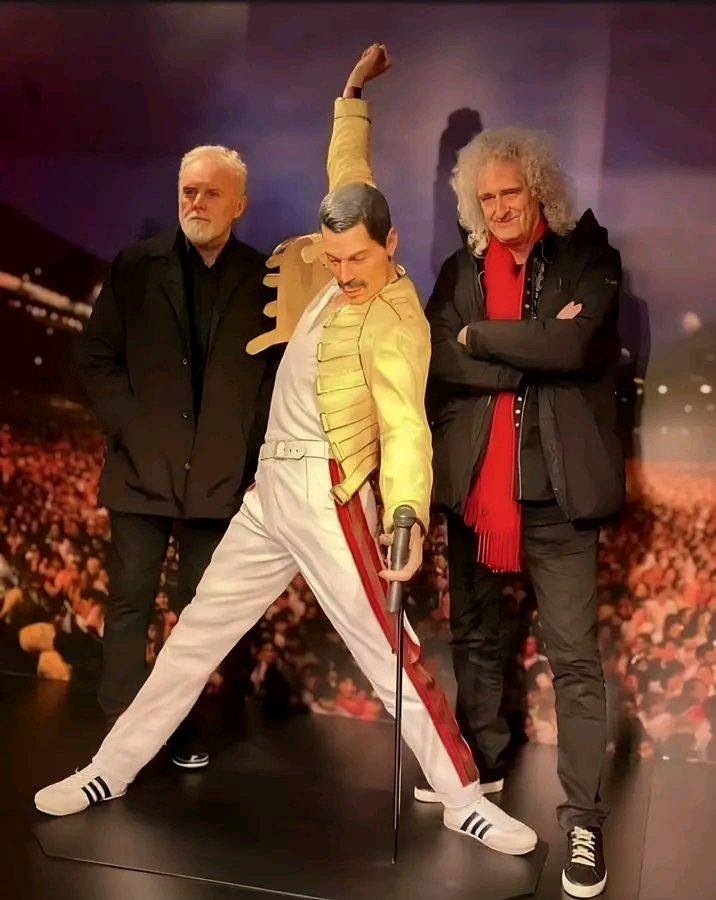Missing Freddie Mercury, the legendary Queen frontman whose powerful voice and unmatched charisma made him a rock icon. His music lives on, inspiring millions worldwide…Watch here
Remembering Freddie Mercury: The Enduring Legacy of Queen’s Iconic Frontman
It has been decades since the world lost Freddie Mercury, yet the influence of his music, voice, and stage presence continues to inspire fans across generations. Known as the dynamic frontman of the legendary rock band Queen, Mercury’s artistry transcended boundaries. His fearless personality, combined with a vocal range that could shift from powerful rock belts to operatic heights, cemented his status as one of the greatest performers in music history. Even today, his legacy resonates as strongly as ever, reminding us why he remains a global icon.
A Voice That Defined an Era
Freddie Mercury, born Farrokh Bulsara in Zanzibar in 1946, moved to England during his youth and eventually embraced his passion for music. When he formed Queen alongside Brian May, Roger Taylor, and later John Deacon, rock music was on the cusp of transformation. Mercury’s remarkable vocal ability became a driving force for the band’s unique sound. Few singers in history could match his versatility—he could soar into falsettos, command operatic passages, and bring raw grit to rock anthems. Songs like Somebody to Love, We Are the Champions, and Bohemian Rhapsody are testaments to his extraordinary ability to blend emotion with technical brilliance.

Critics and fans alike have long agreed that Mercury’s voice was unlike any other. Scientific studies have even examined his vocal cords, revealing unusual vibrato qualities that contributed to his unmatched tone. But beyond the science, his delivery carried a passion that audiences could feel in their souls.
A Performer Without Equal
On stage, Freddie Mercury was pure electricity. His charisma, confidence, and theatricality turned every Queen performance into an unforgettable spectacle. Whether strutting across the stage in iconic costumes, engaging with tens of thousands of fans in stadiums, or delivering tender moments at the piano, Mercury commanded attention.
The 1985 Live Aid concert remains the ultimate showcase of his brilliance. In just 20 minutes, Mercury led Queen through a career-defining set that left both the crowd at Wembley Stadium and millions watching worldwide in awe. Many critics and music historians call it the greatest live performance in rock history. It was a reminder of Mercury’s ability to turn even the largest stages into intimate connections with his audience.
Courage in the Face of Struggles
While Mercury’s public life was filled with success and celebration, his private life came with challenges. He was known for guarding his personal affairs closely, choosing to reveal only what he wished. In the late 1980s, he was diagnosed with AIDS, a battle he kept largely out of the public eye until shortly before his death.
In November 1991, just a day after confirming his illness publicly, Freddie Mercury passed away at the age of 45. His loss was devastating to the music world. Yet, in many ways, his death shone a light on the AIDS crisis, helping break stigma and pushing awareness to the forefront at a time when misinformation was widespread.
A Legacy That Refuses to Fade
Though Freddie Mercury is no longer with us, his impact is eternal. Queen’s music continues to chart decades after its release, fueled by new generations discovering his genius. The biographical film Bohemian Rhapsody (2018), which won Rami Malek an Academy Award for his portrayal of Mercury, reignited global interest in the band. The movie introduced younger audiences to Mercury’s life story, reminding the world of his artistry, vulnerability, and courage.
Meanwhile, surviving bandmates Brian May and Roger Taylor continue to tour with singer Adam Lambert, keeping Queen’s music alive on stage. While Lambert has often acknowledged that no one can truly replace Freddie, he pays tribute to Mercury’s spirit while reimagining the songs for today’s audiences. Fans embrace these performances as celebrations of Freddie’s enduring presence.
An Icon Beyond Music
Mercury’s influence goes beyond just sound. He became a symbol of individuality and freedom of expression. His flamboyant style, from glittering costumes to bold statements, broke barriers in an industry often confined by stereotypes. For many in the LGBTQ+ community, Mercury’s unapologetic authenticity was a beacon of hope and representation at a time when acceptance was rare.
His artistry has inspired countless musicians across genres—rock, pop, opera, and even metal. Artists ranging from Lady Gaga to Foo Fighters have credited him as a major influence. His ability to merge operatic sophistication with rock grit remains unmatched, making him a pioneer who redefined what a rock star could be.
The Eternal Flame of His Music
As fans around the world continue to sing along to Queen’s timeless hits, Freddie Mercury’s spirit lives on. Stadiums still echo with chants of We Will Rock You. Generations still cry out the soaring notes of Bohemian Rhapsody. For many, his songs are more than just music—they are anthems of empowerment, love, and resilience.
Freddie once said, “I won’t be a rock star. I will be a legend.” His words proved prophetic. More than thirty years after his passing, he is remembered not only as a rock star but as a cultural legend whose art continues to inspire millions.
Conclusion
- Missing Freddie Mercury is not just about longing for the man himself but about recognizing the void he left in the music world. His voice, charisma, and artistry are irreplaceable, yet his songs ensure that his spirit remains alive. For fans across the globe, listening to Queen is more than entertainment—it is a way to feel connected to a man whose brilliance lit up stages and hearts alike.
Freddie Mercury may be gone, but his music ensures he will never truly be forgotten. His influence continues to resonate, reminding us all of the power of authenticity, the magic of performance, and the enduring strength of a voice that defined an era.
